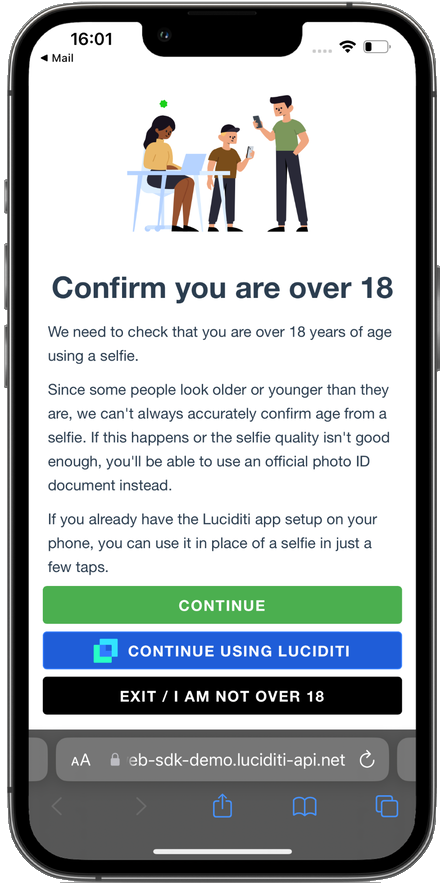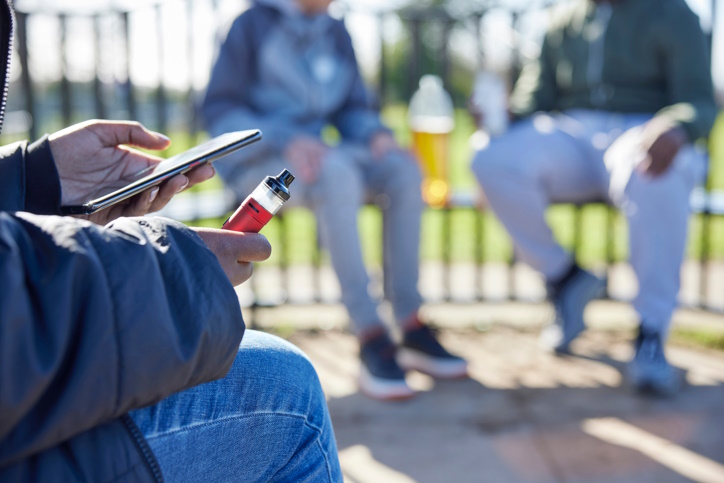Digital ID platform Luciditi is supporting moves to restrict vaping among children and teenagers – which is at ‘epidemic’ levels according to a senior health official. Doctors fear that without urgent action a generation could develop long-term addictions and lung damage. Health ministers are calling for ideas on how to clamp down on the illegal sale of e-cigarettes to under 18s. In response, Luciditi is ready to suggest solutions based on its pioneering age assurance tech.
Vaping is becoming an epidemic among teenagers, according to Dr Mike McKean, vice-president of policy for the Royal College of Paediatricians and Child Health. In 2021, a survey from campaign group Action on Smoking and Health (ASH) of 2,109 children and teens found that 11.2% of 11-17 year olds had tried vaping. By 2022, this had risen to 15.8%. Among 18-year-olds, 40.8% said they have tried an e-cigarette.
The ASH survey stresses that the vast majority of children (83.8%) have never tried or are unaware of e-cigarettes, nevertheless the figures suggest that more than 800,000 children in the UK have illegally accessed a product that can contain nicotine. According to the US government’s Centers for Disease Control, ‘most e-cigarettes contain nicotine. Nicotine is highly addictive and can harm adolescent brain development, which continues into the early to mid-20s.’
In recent years, under-age use of tobacco cigarettes in the UK has been falling, in line with long-term downward trends. Yet little is being done to effectively curb the marketing and selling of vape products to teenagers. Regulations restricting the age-group’s online access to e-cigarettes are not easily enforced.
Illicit vapes enforcement squad
While the sale of tobacco and e-cigarettes to people under the age of 18 is an offence, ASH found that children continue to be sold both. Among children buying both products online, ASH found that purchases of e-cigarettes (10%) are much more common than tobacco cigarettes (4%).
Children would be better protected by tougher enforcement of online age restrictions, which could be supported by Luciditi’s developments in artificial intelligence. Luciditi would allow easy access to vape sites for anyone over 18 while helping to safeguard children’s health.
In April 2023, the government announced that £3m will be invested in an ‘illicit vapes enforcement squad‘, led by Trading Standards officers. This will initially conduct test purchases and remove banned products from shops and at borders, but the government is also looking for other ways of restricting sales.
The Health Department is calling for evidence to “identify opportunities to reduce the number of children accessing and using vapes, while ensuring they remain available as a quit aid for adult smokers.” In response, Ian Moody, Luciditi CEO, said: “The need for a workable twin-track approach, assisting adults while helping children, is something that Luciditi is well equipped to support.”
The government’s new measures are backed by the UK Vaping Industry Association (UKVIA). John Dunne, Director General of the UKVIA, said: “The law is absolutely clear – it is illegal to sell vapes to U18 year olds and therefore it is a criminal offence to do so…There is no doubt that action directed at those illegally selling vape products to children is the way forward.”
Using age assurance to restrict under-age sales
Online sales to children could be reduced by requiring vape websites to restrict access via a secure, digital gateway. This would be better than the revolving door that many currently favour, in the form of a flimsy ‘security question’ along the lines of ‘are you of legal smoking age?’ When it comes to online age restrictions, kids are effectively being asked to mark their own homework.
A digital gateway such as Luciditi would give vendors the assurance they need that users were aged 18 or older. Currently supporting businesses in a range of sectors, Luciditi’s configurable user interface tech can be readily dropped into any website or app.
Luciditi offers two options in managing age assurance. The quickest way of automatically recognising adults and allowing them access is via age estimation. The user simply takes a selfie through their webcam or mobile and the Luciditi Age Estimation feature takes care of the rest.
Supported by an ethical and continually trained machine-learning model, the system is highly capable of telling the difference between children and adults. By verifying ‘liveness’ of the individual, Luciditi is able to recognise and reject manipulated images, latex masks and other spoofing attempts.
Once a vendor has adopted Luciditi’s tech, users can quickly and freely access the website. Some businesses might be able to qualify more than two-thirds of users through estimation, depending on their average age.
A rounded approach to restrictions
Estimation technology decides whether a user fits into the appropriate age-range. Working with a tolerance of plus or minus six years, Luciditi grants swift access to the vast majority of adults. For those at the younger end of the range, Luciditi’s second option in age assurance is initiated automatically. This relies on verification, confirmed via proof of age.
Using a suitable form of ID, the app scans the document, verifies that it’s genuine and that it belongs to the holder in a quick and free process proving their age. Protected by Luciditi’s military-grade security, the data is never forwarded to anyone or anywhere else. Vendors would never see customers’ data. They simply receive instant assurance from Luciditi that the customer is older than 18.

Users who already hold a free Luciditi account, can securely access websites requiring age verification simply by giving approval to a notification sent to their device – without having to scan ID documents or release personal data. Given the often Wild West ways of the internet, the secure protection of data is essential. Thin regulations are hard to enforce and users can’t always be sure who they’re buying from. By restricting access to their personal data, users cut the risk of identity fraud by making it harder for unauthorised third parties to get hold of personal information, whether accidentally or deliberately.
Luciditi’s capabilities could help sites that are struggling to reduce vape sales to children. For health minister Neil O’Brien, the call for action is designed to “clamp down” on those businesses that are “getting children hooked on nicotine. Our call for evidence will also allow us to get a firm understanding of the steps we can take to reduce the number of children accessing and using vapes.”
However, health officials say more still needs to be done. Dr Mike McKean said: “We’re relieved that the UK government has started to focus on the rising levels of children and young people picking up e-cigarettes, but an enforcement squad is just the tip of the iceberg.”
While the government’s announcement initially targets shops and borders, this may prove a hollow victory if online sales are allowed to continue untouched. Luciditi’s Ian Moody believes that: “Age assurance tech can support an online component of the government’s new measures.” A rounded approach is necessary, working both in retail and online. Without it, kids will continue to experiment, sparking further concerns about their long-term health.
Want to know more?
If you would like to find out how Luciditi Age Assurance technology can help contact us for a chat today.
Restrict e-Cigarettes to adults


